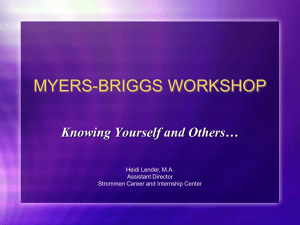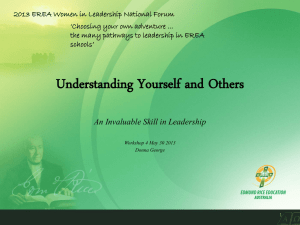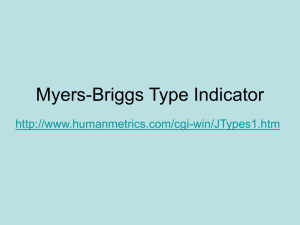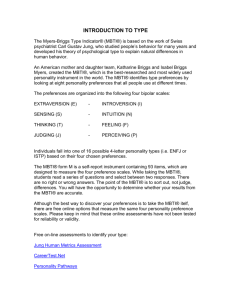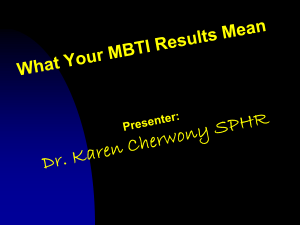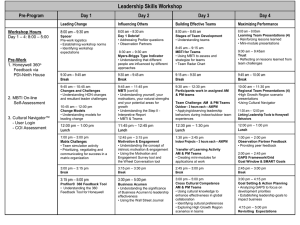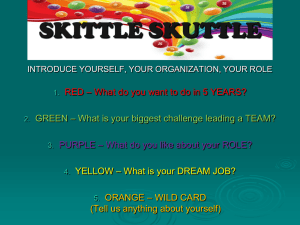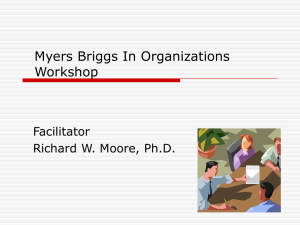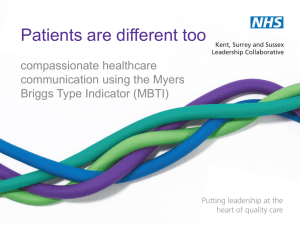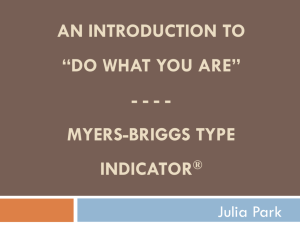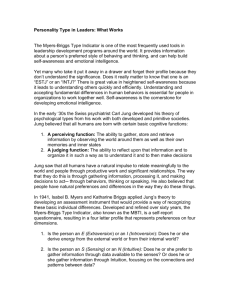MYERS-BRIGGS
advertisement
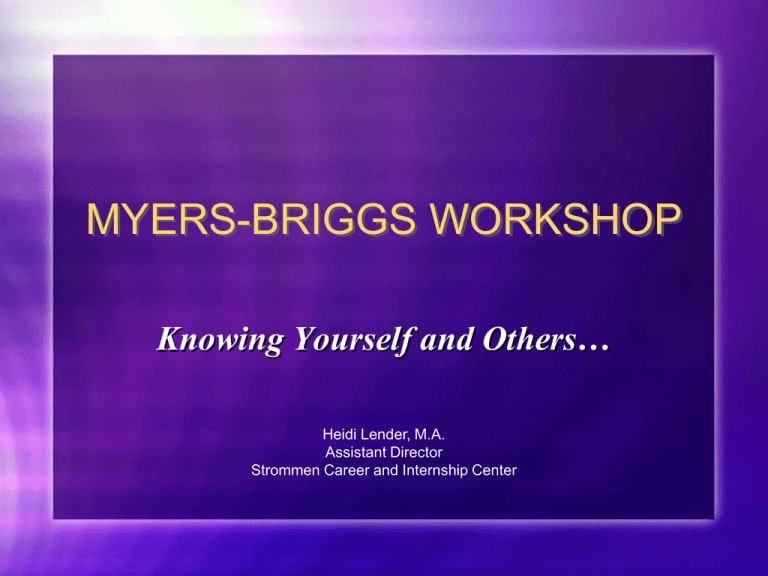
MYERS-BRIGGS WORKSHOP Knowing Yourself and Others… Heidi Lender, M.A. Assistant Director Strommen Career and Internship Center THE OUTCOMES FOR TODAY ARE: To know yourself better To have a better understanding of others To have fun, connect on a more personal level with each other, and see each other as valuable members of the team GROUND RULES Listen and be respectful of each other (don’t interrupt when other’s are sharing information) Confidentiality: What’s said in this room stays in this room Honor each other’s individuality and differences MBTI: NAME EXERCISE MBTI: Psychological Type… Is based on a theory of personality developed by Swiss psychiatrist, Carl Jung. Was based on Jung’s theory of personality in the 1920’s and enhanced in the 1950’s by Myers and Briggs to help people find meaningful and productive work Is based on 16 distinctly different personality types MBTI: Psychological Type… Asserts that differences between people result from inborn preferences. Defines a “psychological type” as The natural, preferred way of using one’s mind and directing energy MBTI: Psychological Type… Asserts that ALL types are equally valuable Is NOT about skills, intelligence, abilities, or technical expertise Does NOT tell you what you can and can’t do Affirms that people are a lot more than their psychological type Environment Culture Education & Training Interests & Motivations EXERCISE It’s your Birthday... Describe your PERFECT day off Extraversion & Introversion THE WAY WE GET OUR ENERGY EXTRAVERSION Energized by people and things Tend to think out loud Live it, then understand it Are sometimes easier to “read” and know Communicate with enthusiasm Prefer learning and doing a lot of different things INTROVERSION Energized by spending time alone Think through internally Understand it, before living it Are more private; share personal information with a select few Keep their enthusiasm to themselves Prefer learning and doing only a few things, but with more depth EXERCISE Take a few minutes to write down words, phrases, or sentences about your candy! Sensing & Intuition The ways we take in information SENSING Trust what is certain and concrete Like ideas that have practical applications Value realism and common sense Tend to be specific and literal; give detailed descriptions Live in the present INTUITION Trust their instincts Like ideas for their own sake Value imagination and innovation Tend to be general and figurative; use metaphors and analogies Live in the future EXERCISE Your team has been working on a state of the art Dispatch Management project for the past 6 months and your entire team was promised a trip to the National Conference to present your findings. The conference will be held in mid- January and will be located in Hawaii. At the last minute the budget was cut and 1 person can’t go. How do you decide who goes? Thinking & Feeling The way we make decisions FEELING THINKING Value logic and fairness Apply impersonal analysis to problems Are motivated by a desire for achievement and accomplishment May be seen as critical, insensitive, or uncaring Value empathy and harmony Consider the effect the decision will have on others Are motivated by a desire to be appreciated and liked May be seen as illogical, emotional, or weak BREAK 10 Minutes EXERCISE create a star Judging & Perceiving The way we function in the world JUDGING Are happiest after decisions have been made Like to work first, play later Set goals and work toward achieving them on time Are product oriented (emphasis is on completing the task) Enjoy finishing projects Are motivated to do projects in advance of the deadline PERCEIVING Are happiest leaving their options open Like to play first, work later Change goals as new information becomes available Are process oriented (emphasis is on how the task is completed) Enjoy starting projects Are motivated to do projects right before the deadline MBTI: RESULTS Hand back results Do your results fit with what you self selected? Percentage of U.S. Population ISTJ 11.6% Jeromy R. Thomas C. ISFJ 13.8% Mackenzie M. Deanna S. INFJ 1.5% INTJ 2.1% ISTP 5.4% Janine B. Tyler V. ISFP 8.8% Katrina N. INFP 4.4% INTP 3.3% ESTP 4.3% ESFJ Taylor F. 8.5% ENFP 8.1% ENTP Kirstin T. Tyler P. Alyssa F. Kyle D. Julia M. 3.2% ESTJ 8.7% ESFP 12.3% ENFJ 2.5% Meghan N. Amanda C. 1.8% ENTJ WHAT PREFERENCES SEEK AND AVOID IN TEAMS ST’S SEEK Showing measurable results Using proven methods to increase productivity Solving problems immediately Managing costs and schedules ST’S AVOID Participating in self-awareness activities Brainstorming with no practical outcome Hypothesizing about the future Using untried methods SF’S SEEK Using tried and true methods Sharing work equitably Appling experience to practical jobs Documenting and developing charts of people’s skills or needs SF’S AVOID Using new/untested procedures Debating the merits of theories Criticizing people they know in an open forum Analyzing and predicting outcomes of strategic models WHAT PREFERENCES SEEK AND AVOID IN TEAMS NF’S SEEK NF’S AVOID Doing work that allows for Working with costs, schedules awareness and growth and figures Fun, harmony, and innovation Setting up hierarchies and authority chains Trying exercises that provide insight into what matters to people Playing politics Working with diversity to Dealing with documentation and improve output paper work NT’S SEEK Positioning the team for the future Linking systems and models Organizational growth Debate on challenging questions NT’S AVOID Doing someone else’s work Popularity contests Administrative details Performing repetitious tasks CLOSING ACTIVITY
